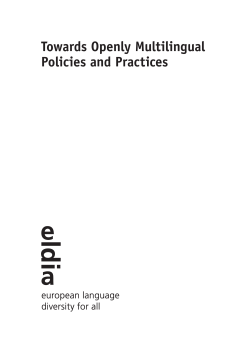
BOOK
Towards Openly Multilingual Policies and Practices
Dr. Johanna Laakso | Anneli Sarhimaa | Sia Spiliopoulou Åkermark | Reetta Toivanen
(2016)
Additional Information
Book Details
Abstract
This book investigates the maintenance of multilingualism and minority languages in 12 different minority communities across Europe, all of which are underrepresented in international minority language studies. The book presents a number of case studies covering a broad range of highly diverse minorities and languages with different historical and socio-political backgrounds. Despite current legislation and institutional and educational support, the authors surmise there is no guarantee for the maintenance of minority languages, suggesting changes in attitudes and language ideologies are the key to promoting true multilingualism. The book also introduces a new tool, the European Language Vitality Barometer, for assessing the maintenance of minority languages on the basis of survey data. The book is based on the European Language Diversity for All (ELDIA) research project which was funded by the European Commission (7th framework programme, 2010–2013).
Johanna Laakso is Professor of Finno-Ugric Studies at the University of Vienna, Austria. Her research interests include Finno-Ugric languages, historical linguistics, language contact and gender linguistics.
Anneli Sarhimaa is Professor of Northern European and Baltic languages at the Johannes-Gutenberg-Universität Mainz, Germany. She is Vice-President of ELEN (European Language Equality Network). Her research interests include sociolinguistics, contact linguistics and language policies.
Sia Spiliopoulou Åkermark is Associate Professor of International Law, Director and Head of Research at the The Åland Islands Peace Institute, Finland. Her research interests include international law, diversity, law and politics, and peace and conflict resolution.
Reetta Toivanen is Academy of Finland Research Fellow and Adjunct Professor for social and cultural anthropology at the Erik Castren Institute of International Law and Human Rights, University of Helsinki, Finland. She is interested in human rights, minorities, power, identity politics and ethnography.
With refreshing Nordic directness, the advance organiser of the foreword “To the Reader” (p. xv) asks about general ideas in regard to the role minority languages play in the political and research landscapes in Europe, and thus concludes: “Don’t be naïve. Don’t believe everything you are told. Read this book”. I second that.
Heinz Kretzenbacher
This book is a rare gem. Issued from a research project, it clearly demonstrates how not only the research community, but the civil society at large can benefit from the interplay of data, research assumptions and methodology that is at the core of research. The authors go far beyond their duty of presenting their research results: they engage the readers in rediscussing their assumptions and pre-conceptions about multilingualism and language minorities in Europe, and they do it beautifully, involving them in a dialogue that reminds of the ancient Greek dialectical method.
This well researched and reasoned book provides the evidence and approaches to enable the human rights advocate to make the arguments for language protection in a clear and convincing manner. This work is an important addition for the advocacy of language protection as part of the human rights agenda.
Table of Contents
| Section Title | Page | Action | Price |
|---|---|---|---|
| Contents | v | ||
| Tables and Figures | xiii | ||
| To the Reader | xv | ||
| 1 Introduction | 1 | ||
| 2 European Language Vitality Barometer – A Novel Tool For Measuring the Degree of Language Maintenance at Group Level | 33 | ||
| 3 Apples, Oranges and Cranberries: Finno-Ugric Minorities in Europe and the Diversity of Diversities | 49 | ||
| 4 Analysis | 151 | ||
| 5 Implications and Recommendations: What Should We Do to Maintain Language Diversity in Europe? | 204 | ||
| 6 Afterword: Disendangering Languages | 217 | ||
| About the Authors | 234 | ||
| References | 236 | ||
| Attachment 1: ELDIA Institutions and Research Teams | 250 | ||
| Attachment 2: ELDIA Workshops, Conferences, and Seminars | 255 | ||
| Index | 257 |
